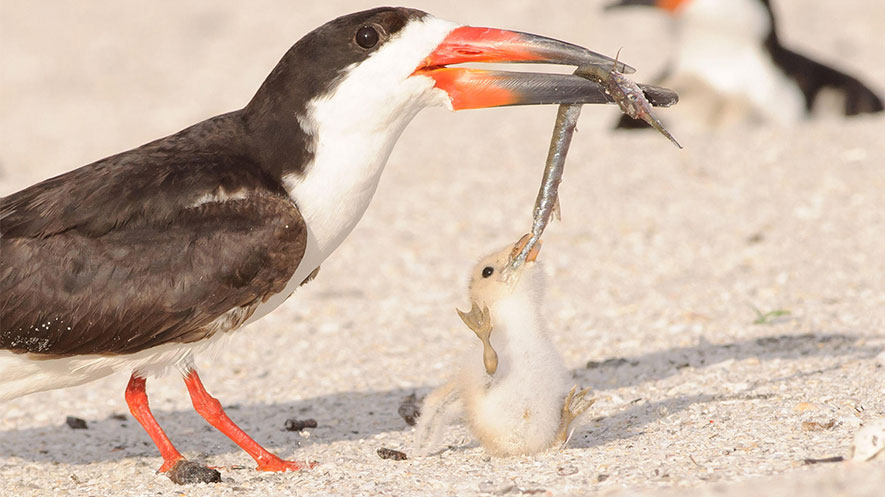After Tropical Storm Cindy battered Florida’s Panhandle, Audubon researchers found that the storm wiped out many of the shorebird chicks and eggs on Florida’s northwest beaches. Heavy rain and high waters were responsible for destroyed beach-nesting habitat on both mainland and island sites. Many rare species are particularly vulnerable since they often nest in low-lying areas.
Despite Audubon’s work to protect and steward Florida’s coastal birds, losses from Cindy were unavoidable. This means for the birds that remain, beachgoers and boaters must be extra careful this holiday weekend.
“It’s sad. Imperiled species like Black Skimmers and Least Terns struggle to raise their young as available habitat becomes harder to find,” said Julie Wraithmell, deputy director, Audubon Florida. “But this storm at the peak of their nesting season devastated colonies across Florida’s panhandle.”
There were a few bright spots. Of the four American Oystercatcher chicks that fledged on a Franklin County island before Cindy’s passage, two were present after the storm. Audubon biologists believe the others flew to a nearby island for shelter.
Beach-nesting birds in Southwest and Northeast Florida were less impacted by the storm, making them even more important to statewide nesting success this year.
“Our researchers and volunteers will continue their good work to ensure a successful nesting year for beach bird families,” said Dr. Marianne Korosy, director of bird conservation, Audubon Florida. “It’s not too late for Black Skimmers to re-nest, and we will be right there to do everything we can to protect chicks and eggs from human disturbance and predation.”
Audubon encourages beachgoers and boaters to exercise caution when enjoying Florida’s beaches during the coming weeks and especially through the Independence Day holiday weekend. Many coastal birds will be attempting to renest and are particularly vulnerable to disturbance while trying to rebuild their families. Now more than ever, volunteer bird stewards are needed at coastal nesting sites for the upcoming holiday weekend to protect nests and chicks. If you’re interested in helping Audubon protect and monitor birds this holiday weekend, email This email address is being protected from spambots. You need JavaScript enabled to view it..
Audubon's Tips to Share the Shores with Birds:
- Impromptu fireworks on Florida's beaches and waterways can have catastrophic effects on vulnerable chicks and eggs. Leave fireworks at home and attend an official display instead.
- Respect posted areas, even if you don't see birds inside them. Birds, eggs, and nests are well-camouflaged, and disturbance by people endangers the entire colony.
- Give colony islands some room. When fishing, be sure not to leave any equipment behind. Always dispose of fishing line and tackle appropriately.
- Avoid disturbing birds. If birds take flight or appear agitated, you are too close.
- Refrain from walking dogs or allowing cats on beaches. Even on a leash, dogs are perceived as predators by birds.
- Don't let pets off boats onto posted islands or beaches.
- If you must walk your dog on beaches, always keep them on a leash and away from birds.
- Please do not feed gulls or herons at the beach. Also, do not bury or leave trash, picnic leftovers, charcoal or fish scraps on the beach. They attract predators of chicks and eggs, such as Fish Crows, raccoons, foxes, coyotes, and Laughing Gulls.
- Beach-nesting birds sometimes nest outside of posted areas. If you notice birds circling noisily over your head, you may be near a nesting colony. Leave quietly, and enjoy the colony from a distance.



